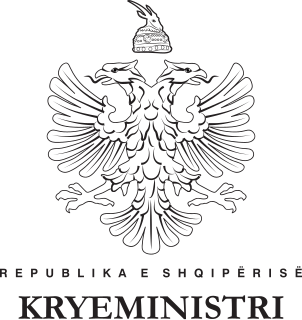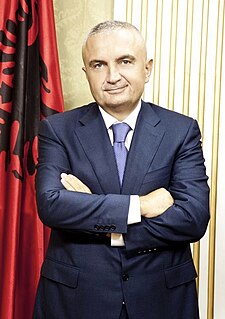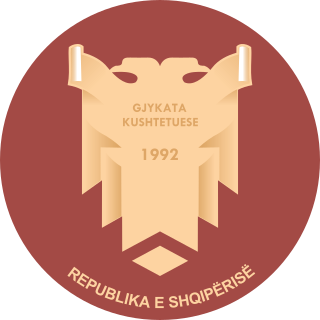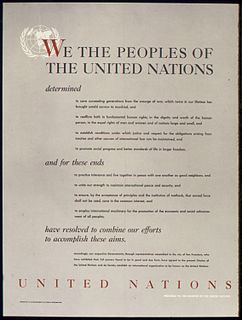Albania is a unitary parliamentary constitutional republic, where the President of Albania is the head of state and the Prime Minister of Albania the head of government in a multi-party system. The executive power is exercised by the Government and the Prime Minister with its Cabinet. Legislative power is vested in the Parliament of Albania. The judiciary is independent of the executive and the legislature. The political system of Albania is laid out in the 1998 constitution. The Parliament adopted the current constitution on 28 November 1998. Due to political instability, the country has had many constitutions during its history. Albania was initially constituted as a monarchy in 1913, briefly a republic in 1925, then it returned to a democratic monarchy in 1928. It later became a socialist republic until the restoration of capitalism and democracy in 1992.

The Prime Minister of Albania, officially styled the Prime Minister of the Republic of Albania, is the head of government of the Republic of Albania and as well the most powerful and influential person in Albanian politics. The Prime Minister holds the executive power of the nation and represents the Council of Ministers and chairs its meetings.

The President of Albania, officially styled the President of the Republic of Albania, is the head of state, commander-in-chief of the military and the representative of the unity of the Albanian people.
The Counties of Albania are second-level administrative divisions in the Republic of Albania.
Regular elections in Albania are mandated by the Constitution and legislation enacted by Parliament. The Parliament (Kuvendi) has 140 members elected for four-year terms. The electoral system is closed list proportional representation. There are 12 multi-member constituencies corresponding to the country's 12 administrative regions. Within any constituency, parties must meet a threshold of 3 percent of votes, and pre-election coalitions must meet a threshold of 5 percent of votes.

The Parliament of Albania or Kuvendi is the unicameral representative body of the citizens of the Republic of Albania; it is Albania's legislature. The Parliament is composed of not less than 140 members elected to a four-year term on the basis of direct, universal, periodic and equal suffrage by secret ballot. The Parliament is presided over by a Speaker of the Parliament, who is assisted by at least one deputy speaker. The electoral system is based on party-list proportional representation. There are 12 multi-seat constituencies, corresponding to the country's administrative divisions.

The Assembly of the Republic of North Macedonia or the Sobranie, is the unicameral representative body of the citizens of North Macedonia; it is North Macedonia's sole legislature. According to the Constitution, the Sobranie represents the people and is vested with legislative power. It can have between 120 and 140 MPs, elected by proportional representation from 6 electoral districts, each contributing 20 MPs, and there are also 3 reserved seats elected from the Macedonian diaspora which are awarded only if the voter turnout was sufficient. MPs are elected for a term of four years and cannot be recalled during their term. The Sobranie is presided over by a Speaker. Its organization and functioning are regulated by the Constitution and Rules of Procedure. The Assembly's seat is in the nation's capital, Skopje.

The current Constitution of Montenegro was ratified and adopted by the Constitutional Parliament of Montenegro on 19 October 2007 on an extraordinary session by achieving the required two-thirds supermajority of votes. The Constitution was officially proclaimed as the Constitution of Montenegro on 22 October 2007. This Constitution replaced the Constitution of 1992.
It is the fundamental law of the Republic of Albania. The present Constitution of Albania was adopted by the Parliament on 28 November 1998. It is split up over many different acts. The document succeeded the 1976 Constitution, originally adopted at the creation of the People's Socialist Republic of Albania on 28 December 1976 and heavily amended on 29 April 1991.

The Albanian Republic was the official name of Albania as enshrined in the Constitution of 1925. Albania became a de facto protectorate of the Kingdom of Italy after the signing of the Treaties of Tirana of 1926 and 1927. Albania was declared a constitutional monarchy in 1928. Upon its inception, Italy demanded to be allies with the republic. This was done largely to increase Italy's influence in the Balkans, and to aid Italian and Albanian security in their territorial feuds with the Second Hellenic Republic and the Kingdom of Yugoslavia.
Trade unions in Albania have had an unstable existence in recent decades, mirroring the regional political turbulance in Albania. Since the 1991 defeat of the Albanian Party of Labour (APL), independent trade unions have asserted themselves, with two main national trade union centres; the United Independent Albanian Trade Unions (BSPSh) and the Confederation of Trade Unions (KSSh).

The Deputy Prime Ministers of Albania, officially styled the Deputy Prime Minister of the Republic of Albania, is the deputy head of government of Albania. In the absence of the Prime Minister of Albania the Deputy Prime Minister takes over his functions, such as chairing the Cabinet of Albania and the Council of Ministers of Albania. The Office is the second senior minister of the cabinet in the executive branch of the government in the parliamentary system in the Republic of Albania.

The Constitution of North Macedonia is a codified constitution outlining the country's system of government and basic human rights adopted in the Parliament of the Republic of Macedonia on November 17, 1991.

The Constitutional Court of the Republic of Albania is the final authority for the interpretation of the Constitution (Kushtetuta) and the compliance of laws in accordance with the constitution. As of article 168, the ourt guarantees respect for the Constitution and makes final interpretations of it.

The People's Advocate is the Albanian office of the ombudsman, a justice-advising entity for the public.

The Socialist Autonomous Province of Kosovo, comprising the Kosovo region, was one of the two autonomous provinces of Serbia within Yugoslavia, between 1945 and 1990, when it was renamed Autonomous Province of Kosovo and Metohija.

The Chief of the General Staff is the chief of the General Staff and Albanian Armed Forces. The chief of staff is appointed by the President of Albania, who is the commander-in-chief. The position dates back to the Provisional Government of Albania. The current Chief of the General Staff is Brigadier General Bardhyl Kollçaku
The Judiciary of Albania interprets and applies the law of Albania. Albania's judicial system is a civil law system divided between courts with regular civil and criminal jurisdiction and administrative courts. Albanian law is codified and based on the French law. It is governed by the High Council of Justice (Këshilli i Lartë i Drejtësisë), and its management is aided by the office of the President of Albania, the Ministry of Justice, and the various courts chairpersons.
Albania has been a secular state since its founding in 1912, despite various changes in political systems. During the 20th century after Independence (1912) the democratic, monarchic and later the totalitarian communist regimes followed a systematic secularisation of the nation and the national culture. The Albanian understanding of secularism has strong influences from the French “Laicité”.













